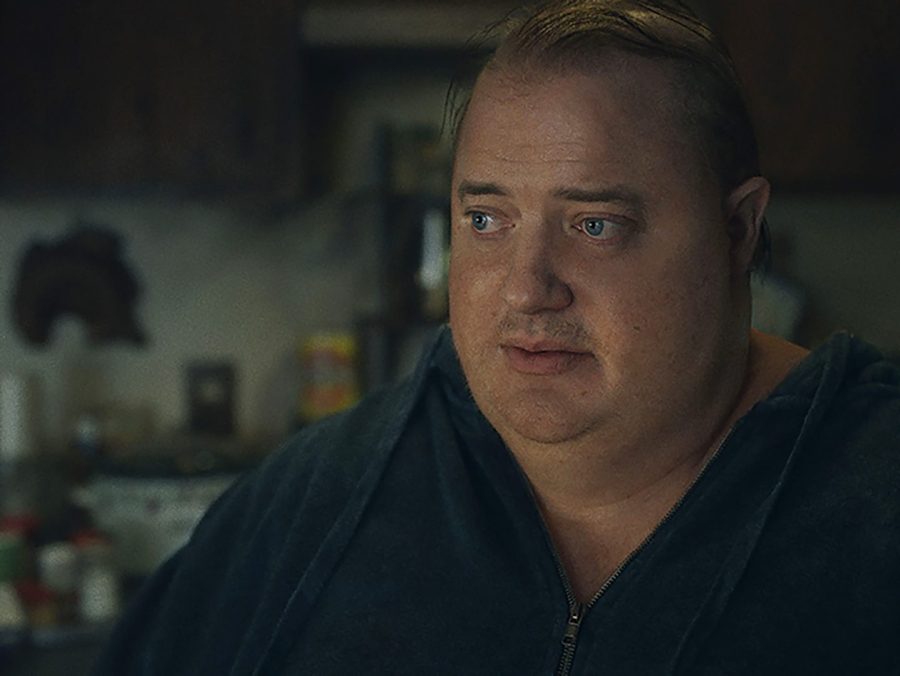Review: Brendan Fraser is magnetic in heartfelt drama ‘The Whale’
Feb 6, 2023
Darren Aronofsky’s “The Whale,” which was released in theaters nationwide Dec. 21, is a bit uncomfortable to watch at times, but Brendan Fraser’s powerful performance anchors this tale of love, loss, and the power of the human spirit.
Brendan Fraser is a huge part of the success of “The Whale.” The film, written by Samuel D. Hunter and based on Hunter’s 2012 play of the same name, delves into some heavy topics, yet Fraser keeps our eyes glued to the screen.
“The Whale” refers to Charlie (Fraser), a reclusive and morbidly obese English professor. However, it also refers to Herman Melville’s famed novel “Moby Dick,” and specifically an essay about the book that Charlie keeps and has read to him on multiple occasions. This essay actually serves to kick-start the plot of “The Whale,” when Charlie asks missionary Thomas (Ty Simpkins) to read it to him.
With critically high blood pressure and refusing to go to the hospital, Charlie is cared for by nurse Liz (Hong Chau). “The Whale” is very much a drama, but a lot of the film’s humor is courtesy of Liz. My favorite joke was when she got Charlie a wheelchair, and when he asked what it was, she responded, “What does it f**king look like?”
Oftentimes in American media, screenwriters tend to dance around the issue of obesity. “The Whale” does not do this. In fact, Charlie is one of the most, if not the most, multidimensional obese characters in any movie or show.
This spotlight on Charlie’s condition also comes with problems. Namely, “The Whale” depicts obese people as depressed and constantly engaging in binge eating.
Realizing that he is dying, Charlie attempts to connect with his estranged teenage daughter, Ellie (Sadie Sink). As can be expected, this attracts the ire of his ex-wife, Mary (Samantha Morton).
Ellie and Mary are not afraid to confront Charlie, and several arguments over the course of the film reach critical points. After one argument with Mary, Charlie tells her that he needs to know that he did one thing right in his life, meaning Ellie.
The raw emotion from Fraser in that one line is the best delivery of all of 2022 in film.
Aside from Fraser, my second-favorite performance in “The Whale” is Sink’s. Ellie has much of the same sardonic humor that made Sink’s Max Mayfield such a favorite in “Stranger Things,” but here, it masks a deep anger with not just Charlie, but the world at large.
Mary even goes so far as to call her daughter evil, a claim Charlie vehemently denies.
This is my other problem with “The Whale.” If Mary was so convinced that Ellie was evil, why didn’t she seek counseling for her?
We know that Ellie sees her guidance counselor on a regular basis, so it seems like the next logical step would be for Mary to seek out additional help instead of just keeping it to herself. A professional diagnosis could only be good for Ellie.
Fortunately for her and Charlie, though, Ellie is not evil, and does care about other people, as we find out when she gets Thomas’ family to forgive him so that he can move back home. At the end of the film, when Charlie is near death, he asks Ellie to read him the essay, which we find out is hers from several years prior. Initially begging him not to make her read it, she finally relents, allowing Charlie to be at peace in his final moments.
“The Whale” is a remarkable tale of triumph and human connection, as told through a lens that we don’t often get to see in movies. Brendan Fraser deserves all the awards he’s getting.


















